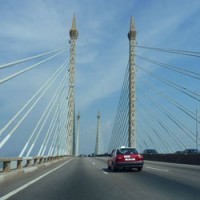Penang Chief Minister Lim Guan Eng’s proposed solution to the island’s long-standing traffic woes continues to draw criticism; it is worth examining the issue in some detail, aside from the partisan name-calling that is inevitable this close to GE13.
A great deal will be spent on this project, which will add highways and undersea tunnels largely to increase the island’s connection to the Peninsular. It is not clear what problem the solution is addressing.
Penang’s historic economic growth brought with it traffic snarls that have been the bane of the island’s – and the state’s – residents for years. During GE12, DAP grassroots made it a special issue, lamenting Barisan Nasional’s failure to resolve the traffic problem despite years of governance. While only one of many issues that led to the DAP’s takeover of the state, it was undeniably an important one.
When Lim Guan Eng was dropped into Penang for the last elections, he made broad promises that on the whole could be summarised as fixing everything that Barisan Nasional had not. Whether it was because of a lack of interest in the traffic problems, divided attention due to his holding his state seat and his seat in the Dewan Rakyat, or because of a simple inability to address the issue, Guan Eng left behind a number of GE12’s promises.
Because the state government waited until GE13 was mere weeks away, there is now an unfortunate flavour of politics about the whole thing. This is worse because there are concerns about the project quite aside from the mere political concerns.
One of the foremost is transparency, or lack thereof. The DAP has been a vocal and public fan of transparency, albeit with mixed results, to the extent of incorporating it in their sloganeering. Yet this project was announced quite unexpectedly, with bids apparently requested, tendered, and approved before widespread public knowledge of the project. (The idea was first mooted last year, but received relatively little attention at the time.)
As the entire matter is to be handled by a single contractor – an unusual turn in an undertaking of this size – questions have been raised about the contractor about whom no one except Guan Eng knows much.
It is not an exaggeration to note that if Barisan Nasional had performed the same feat, Guan Eng would be demanding a Royal Commission of Inquiry into the matter.
Yet transparency is not the only issue on which the DAP state government has raised eyebrows. As part of a generalised ‘green’ push, the DAP promised environmentally-friendly initiatives and reforms, which are by and large still promises rather than acts. It was therefore surprising to see Guan Eng push for a system that would bring more vehicles into Penang, a move that will do little to lessen the state’s carbon ‘footprint’. His explanation that Putrajaya would need to be involved for a mass transit system – his excuse for opting for highways and tunnels instead – merely raises the question of why George Town did not discuss the matter with Putrajaya first.
Yet the greatest issue about the system is that it will do very little for Penang’s traffic concerns.
Penang’s traffic problems are essentially two, discrete concerns. Transit to and from the island from Seberang Prai across the Penang Bridge can be a nightmare, and with the second bridge still underway, that nightmare shows little sign of easing. It is this problem that the highway and tunnel system is apparently intended to alleviate.
Yet the island has its own significant traffic concerns, and dumping more vehicles at a higher rate – the inevitable result of opening yet another transit route on to the island – will obviously not help with this. (Engineers consulted for this report are unanimous that the rate of vehicles leaving the island through the new transit system will only slightly offset the effect of those entering.)
Moreover, as Guan Eng is working to assure Penangites that this new project will not involve the wholesale demolition of the island’s existing infrastructure, the engineers tasked with matching the new to the old without creating new traffic headaches are likely not sleeping well.
What will happen on the rest of the roads is unlikely to be much better.
By all measures, Guan Eng is determined to see this project completed. The DAP is making no secret of treating GE13 as a referendum on this plan, a somewhat unfair proposition as it was only unveiled mere weeks ago, and the rakyat is unlikely to have the full measure of it before then.
This appears to be of little concern to Guan Eng. It is therefore likely that if the DAP is returned as the state’s government, he will get his wish.
However, he may find going to and from the office a bit messier as a result.

